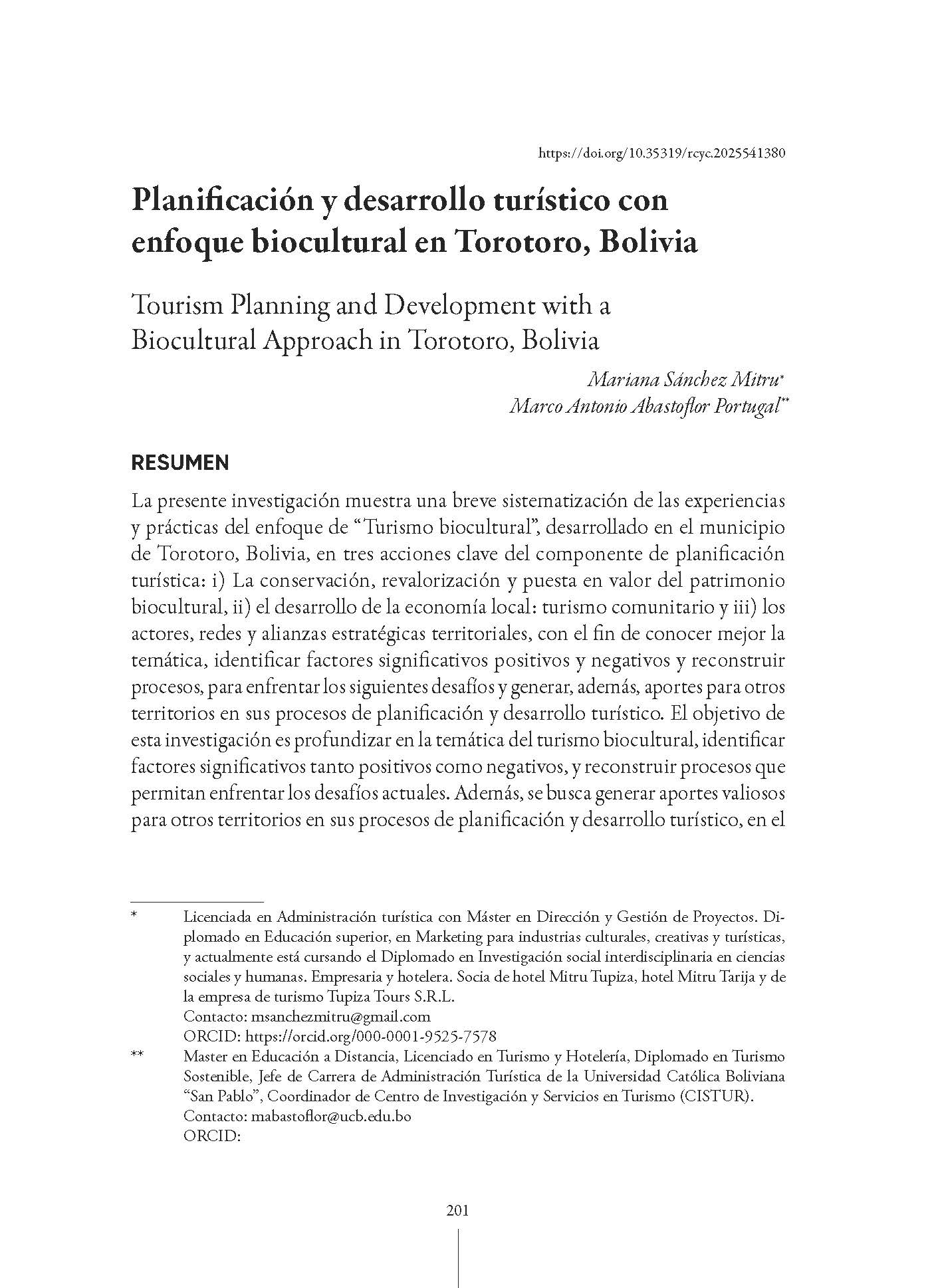Tourism Planning and Development with a Biocultural Approach in Torotoro, Bolivia
DOI:
https://doi.org/10.35319/rcyc.2025541380Keywords:
Torotoro, sustainable tourism, biocultural tourism, cultural tourism, intangible heritage, integral tourism developmentAbstract
This research shows a brief systematization of the experiences and practices of the “Biocultural Tourism” approach developed in the municipality of Torotoro, Bolivia, in three key actions of th e tourism planning component: i) Conservation, revaluation and enhancement of heritage biocultural, ii) the development of the local economy: community tourism and iii) the actors, networks and territorial strategic alliances, in order to better understand the subject, identify signifi cant positive and negative factors and rebuild processes, to face the following challenges and generate, in addition, contributions for other territories in their tourism planning and development processes. Th e objective of this research is to delve into the topic of biocultural tourism, identify signifi cant factors both positive and negative, and reconstruct processes that allow us to face current challenges. Additionally, it aims to generate valuable contributions for other territories in their planning and tourism development processes, within the framework of a Bicentennial that invites us to refl ect on our cultural and natural heritage and its role in the future of Bolivia.
Downloads
References
Gobierno Autónomo Municipal de Torotoro (GAMTT) (2016-2020). Plan de desarrollo territorial de Torotoro (PTDI).
Gobierno de México, Secretaría de Educación Pública (2022). Campus Querétaro. linintoperacionacademias.pdf: http://www.itq.edu.mx/lineamientos/linintoperacionacademias.pdf
Juárez, M.J. (mayo de 2019). Hospitalidad, liturgia e identidad en La Odisea, tres valores que se implican mutuamente. https://www.academia.edu/44042725/Hospitalidad_Liturgia_e_Identidad_en_La_Odisea_tres_valores_que_se_implican_mutuamente
Medina Aveledo, G. (2018). El enfoque integral holónico de Ken Wilber, otra visión a la hora de investigar. Salus, 22(1), 8-11. https://www.redalyc.org/journal/3759/375956270003/html/
Medina, J. (2019). Pasos hacia una biosofía del Vivir Bien. La Paz: Macha ediciones.
Medina, J. y Mérida, G. (2014). Acerca del turismo biocultural: hacia la construcción de un modelo. Pr ograma Nacional Biocultura, 1-13.
Mérida Coimbra, G., Sanchez Mitru, M., Cardona Garcés, D. y Solíz, V. (2013). Turismo biocultural: Tupiza: un modelo de gestión comunitario para el vivir bien. Bo livia: Programa Nacional Biocultura.
Molina E., S. y Rodríguez A., S. (2005). Plani_ cación integral del turismo: un enfoque para Latinoamérica. México: Trillas.
Organización Mundial del Turismo (OMT). (2022). Gu ía para administraciónes locales: desarrollo turístico sostenible. Madrid: CEOMT.
Orozco Alvarado, J. y Quinteros Santos, J.L. (2008). Impactos socioculturales y medioambientales del turismo. En J. Orozco Alvarado, P. Núñez Martínez y G. Virgen Aguilar (coords.), Desarrollo turístico y sustentabilidad social (p p. 11-28). México: Porrúa.
Parque Nacional Torotoro (PNTT). (2013-2022). Plan de manejo del Parque Nacional Torotoro. Servicio Nacional de Áreas protegidas.
Pulido, J.I. (2005). Criterios para una política turística sostenible en los parques naturales de Andalucía. Sevilla: Consejería de Turismo, Comercio y Deporte de la Junta de Andalucía.
RIMISP, Centro Latinoamericano para el Desarrollo Rural (18 de junio de 2013). I nforme Latinoamericano 2013. https://rimisp.org/sintesis-informe-2013/

Downloads
Published
How to Cite
Issue
Section
License
Copyright (c) 2025 Revista Ciencia y Cultura

This work is licensed under a Creative Commons Attribution-NonCommercial 4.0 International License.








